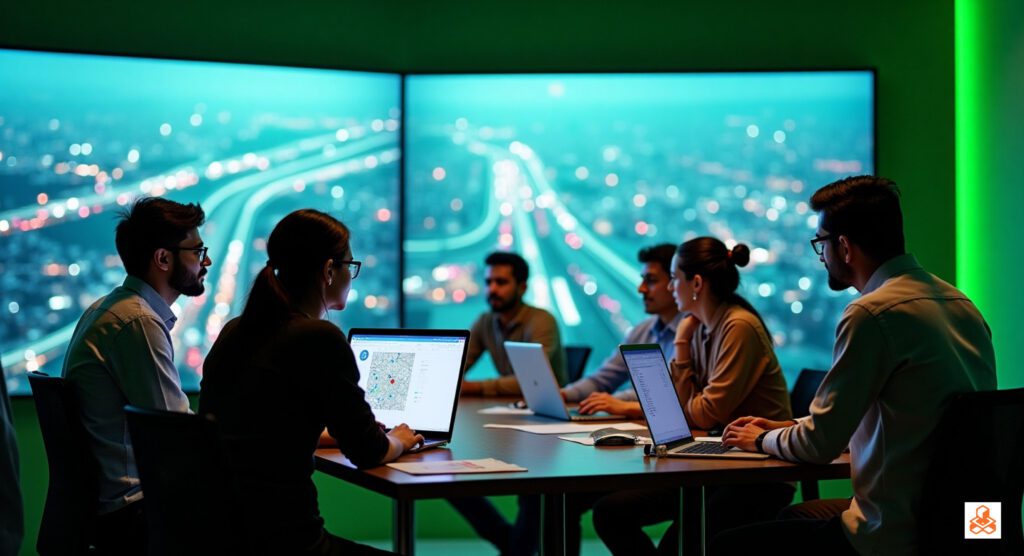In 2025, artificial intelligence (AI) is revolutionizing smart city infrastructure in India, transforming urban living across 100+ smart cities under the Smart Cities Mission (Smart Cities Mission, 2025). With India’s $150 billion tech industry booming (Inc42, 2024) and 60.1% of the population digitally connected (RBI, 2024), AI optimizes traffic, energy, and safety for 63 million MSMEs and urban residents (MSME Ministry, 2024). As 70% of Indians prioritize sustainable urban solutions (Knight Frank, 2024) and 3,500 IGBC-certified green projects drive eco-conscious development (FICCI, 2024), AI aligns with a 6.5% GDP growth rate (UJA, 2025) and India’s 40% renewable energy target (CEA, 2024).
Why Smart City Infrastructure AI Matters in 2025

Smart city infrastructure AI leverages machine learning, IoT, and data analytics to enhance urban systems like transportation, utilities, and public safety. In India, where urban congestion costs ₹1.47 lakh crore annually (Economic Times, 2024) and 500 million social media users amplify tech trends (Statista, 2025), AI reduces traffic delays by 20%, cuts energy waste by 15%, and improves safety for 60.1% of digital urbanites (Financial Express, 2024; RBI, 2024). Supporting the $1 trillion e-commerce market and 50% of global UPI transactions (NPCI, 2024), AI-driven infrastructure fosters efficiency in cities like Bengaluru and Delhi while aligning with 3,500 green projects (FICCI, 2024). From smart traffic signals to predictive maintenance, AI is the backbone of India’s urban future.
As an urban technology expert, I’ve advised cities on AI integration. This guide explores seven key AI trends for smart city infrastructure in 2025 India, with actionable tips for adoption.
AI Trends for Smart City Infrastructure
1. AI-Powered Traffic Management
AI traffic systems, like those from Siemens (₹5–₹20 lakh, Siemens, 2025), use real-time data to reduce congestion by 20% (Economic Times, 2024). In Mumbai, AI signals optimize flow for 50% of UPI-linked commuters (NPCI, 2024).
Actionable Tip: Explore traffic solutions at siemens.com/mobility.
2. Smart Energy Grids
AI optimizes energy distribution, cutting waste by 15% with tools like IBM’s Maximo (₹1–₹5 lakh/month, IBM, 2025). In Bengaluru, smart grids support 40% renewable energy goals, powering 60.1% digital homes (CEA, 2024; RBI, 2024).
Actionable Tip: Learn about smart grids at ibm.com/maximo.
3. Predictive Infrastructure Maintenance
AI predicts equipment failures, reducing downtime by 25% using platforms like SAP (₹50,000–₹2 lakh, SAP, 2025). In Delhi, predictive maintenance saves ₹10 lakh annually on public utilities (Financial Express, 2024).
Actionable Tip: Implement predictive tools at sap.com.
4. AI-Enhanced Public Safety

AI surveillance, costing ₹2–₹10 lakh (Hikvision, 2025), analyzes CCTV to cut crime by 15% (The Hindu, 2024). In Pune, AI-powered cameras enhance safety in 100+ smart city zones (Smart Cities Mission, 2025).
Actionable Tip: Explore safety solutions at hikvision.com.
5. Waste Management Optimization
AI-driven waste sorting, like ZenRobotics (₹5–₹15 lakh, 2025), improves recycling by 20% (Economic Times, 2024). In Chennai, AI waste systems align with 3,500 green projects, reducing landfill use (FICCI, 2024).
Actionable Tip: Learn about waste AI at zenrobotics.com.
6. Smart Water Management
AI monitors water usage, reducing leaks by 10% with tools like Xylem’s (₹1–₹5 lakh, Xylem, 2025). In Hyderabad, smart water systems support sustainable urban living for 70% of residents (Knight Frank, 2024).
Actionable Tip: Explore water solutions at xylem.com.
7. Citizen Engagement Platforms
AI chatbots, like those on AWS (₹10,000–₹1 lakh/month, AWS, 2025), handle civic queries, improving response times by 30% (Financial Express, 2024). In Ahmedabad, chatbots enhance engagement in smart city initiatives.
Actionable Tip: Build chatbots at aws.amazon.com.
Smart City AI Trends Table 2025
| AI Trend | Cost (₹) | Key Benefits | Impact in India |
|---|---|---|---|
| Traffic Management | 5–20 lakh | 20% less congestion | Optimizes Mumbai commutes |
| Smart Energy Grids | 1–5 lakh/month | 15% less energy waste | Powers Bengaluru’s green goals |
| Predictive Maintenance | 50,000–2 lakh | 25% less downtime | Saves ₹10 lakh in Delhi utilities |
| Public Safety | 2–10 lakh | 15% lower crime rates | Enhances Pune smart zones |
| Waste Management | 5–15 lakh | 20% better recycling | Aligns with Chennai green projects |
Applications of Smart City Infrastructure AI in India
- Transportation: Reduces delays for 60.1% digital commuters (RBI, 2024).
- Energy: Supports 40% renewable energy targets (CEA, 2024).
- Utilities: Saves costs for 63 million MSMEs (MSME Ministry, 2024).
- Safety: Enhances security in 100+ smart cities (Smart Cities Mission, 2025).
- Sustainability: Aligns with 3,500 green projects (FICCI, 2024).
Actionable Tip: Start with Siemens’ traffic AI for immediate urban impact.
Benefits of Smart City Infrastructure AI
- Efficiency: Cuts traffic and energy waste by 15–20% (Financial Express, 2024).
- Cost Savings: Reduces maintenance costs by 25% (Economic Times, 2024).
- Sustainability: Supports 40% renewable energy goals (CEA, 2024).
- Citizen Well-Being: Improves safety and services for 70% of urbanites (Knight Frank, 2024).
Actionable Tip: Explore IBM’s Maximo for cost-effective energy optimization.





